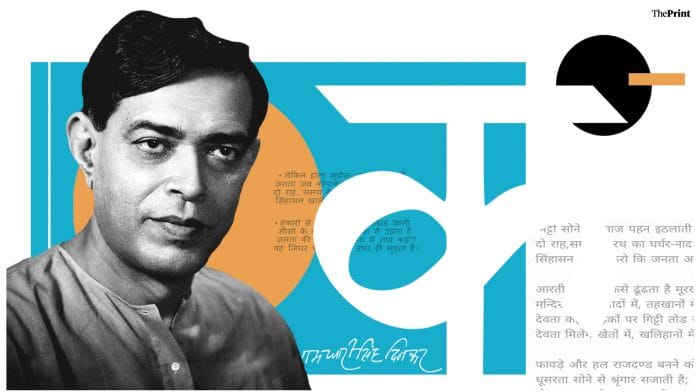“Dinkar ji’s entire literature is associated with the farmers and their livelihood. It is about the poor and the villages,” Prime Minister Narendra Modi said at the golden jubilee celebrations of the works of Ramdhari Singh Dinkar in 2015. “His creations can relate to the past, present and the future… Such is the power of the writings of Dinkar Ji.”
In the foreword to Dinkar’s Sanskriti Ke Char Adhyay, former Prime Minister Jawaharlal Nehru wrote that he hoped this book would help us better understand India. It wasn’t the first time Dinkar had been held up as a mirror of India. In 1974, Lokanayak Jayprakash quoted Dinkar’s soul-stirring poem Janatantra ka Janm. The lines Sinhasan khali karo ki janata aati hai (Vacate the throne, for the people are coming) became his warning to then Prime Minister Indira Gandhi. And leaders across party lines, from the BJP’s Giriraj Singh to CPI (M)’s Kanhaiya Kumar, have visited Dinkar’s native village of Begusarai to garland his statue.
The might of his pen binds people across party politics and ideology. But Ramdhari Singh Dinkar, although popularly called Rashtrakavi (National Poet), was a janakavi (people’s poet) in the truest sense. His poems spoke to every Indian. Young, old, woman, man, beyond the barriers of class, caste and religion, his words evoked a variety of sentiments in people’s hearts. Whether it was the veer ras (heroic style) or shringaar ras (romantic style), Dinkar had mastered it all.
When he was awarded the prestigious Jnanpith award, his contemporary Hindi poet Harivansh Rai Bachchan had commented that Dinkar should be given four Jnanpiths and not just one — for his prose, poetry, language and service to Hindi literature.
On the poet’s 46th death anniversary, ThePrint looks back at his life, nationalism and poetic legacy.
Also read: Celebrating PL Deshpande — the ‘RK Laxman of prose’
Dinkar’s nationalism
Dinkar was born on 23 September 1908 in a village in Begusarai, now in Bihar, to a family of farmers. His mother raised him and his siblings after his father died when he was only two years old. Dinkar completed his graduation from Patna University and later became the Head of Department of Hindi in Muzzafarpur College.
After Independence, Dinkar was appointed a member of the Rajya Sabha and later became the Hindi adviser to the Government of India. He also had a stint as the Vice-Chancellor of Bhagalpur University.
He is often remembered for his poems raging with patriotic sentiments, and was among the first few poets who outrageously condemned Mahatma Gandhi’s killing. He wrote:
“Kahne mein jeebh siharti hai
Moorchiit ho jaati kalam
Haay, Hindu hi tha wah hatyara”
(The tongue twists while saying this
The pen faints
Alas, the murderer was a Hindu)
On Dinkar’s Sahitya Akademi Award winning book Sanskriti Ke Chaar Adhyay, journalist Ravish Kumar wrote that one can see the danger of communalism and religious politics with a balanced view through his book. “Dinkar does not view the creation of Indianness through the prism of Hindu defeat or Muslim victory. He attacks the religious identities and evils which stagnate our world-view,” he added.
Dinkar himself addressed the controversy around the book in the introduction of its second edition. “The controversy that followed the first edition suggests that this book must have hurt everyone. The speeches made from different forums about this book show that Sanatanis, Aryasamaji and Brahmasamaji are equally saddened by my arguments. The supporters of radical Hindutva are not pleased with the book,” he wrote.
He also attacked casteism and class structures through his poems.
In his epic Rashmirathi, he challenged the caste system through the story of Karna from the Mahabharat.
“Paate hain samman tapobal se bhootal par shoor,
Jaati-jaati ka shor machaate kewal kayar kroor”
(Honoured are those who acquire their strength through their hard work
Only the cruel and cowardly make noise about caste)
Also read: A hundred years of Amrita Pritam, who wrote passionately about love, Partition & sexuality
Poetry that is relevant today
Filled with vigour and humanism, his poetry made the establishment uncomfortable right from the days when India was under British rule, when he used to get his poems published under the pseudonym of Amitabh. Despite a job in the British government, he always wrote against the Raj. When the government began to realise that he wrote against them, he was transferred 22 times in four years.
Even though Dinkar remained close to the corridors of power after Independence as a Rajya Sabha MP, he never shied away from questioning the policies of the government. His rhythmic verse play in Samar Shesh Hai still forces us to confront uncomfortable truths.
“Kumkum? Lepun kise? Sunaun kisko komal gaan?
Tadap raha aankhon ke aage bhookha hindustan,
Sakal desh mein halaahal hai, Dilli mein haala hai.
Dilli mein roshni, shesh Bharat mein andhiyala hai”
(To whom should I sing sweet melodies?
The nation is starving in front of our own eyes.
The whole country is churning the poison, while Delhi is enjoying its wine.
Darkness is prevailing in the whole country while Delhi shines)
Also read: Mir Taqi Mir — a master of Urdu who was in love with Delhi







Cannot believe print got even Dinkar wrong. The author of this article is a pure amateur.